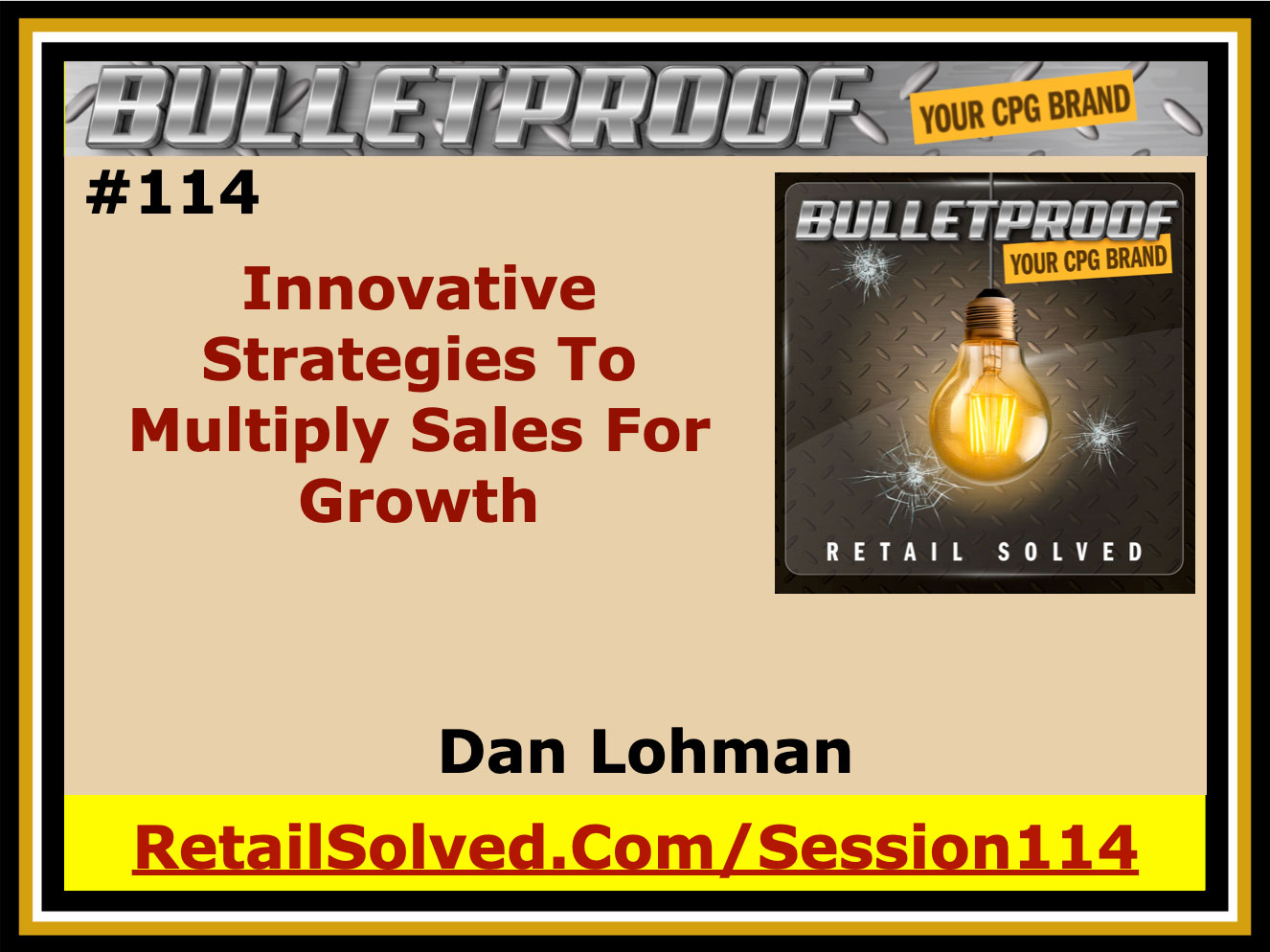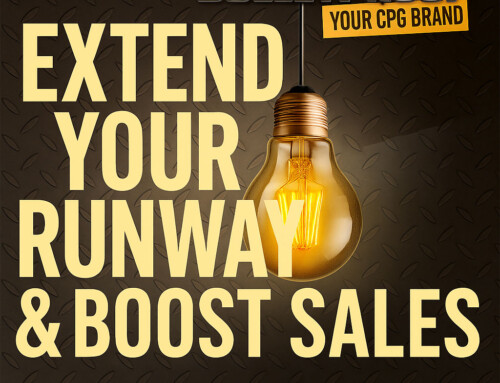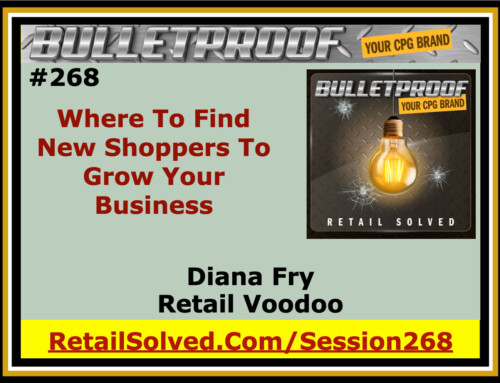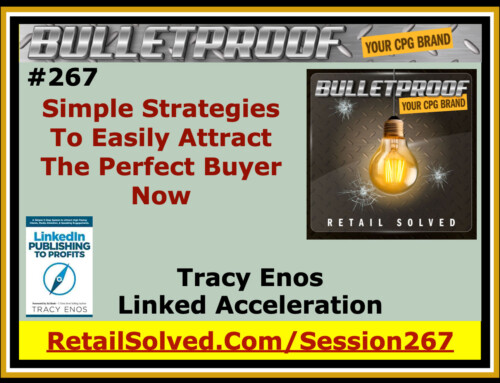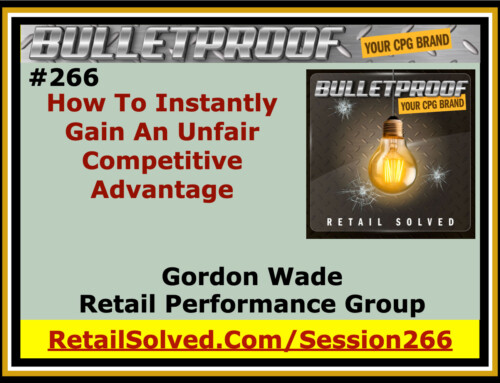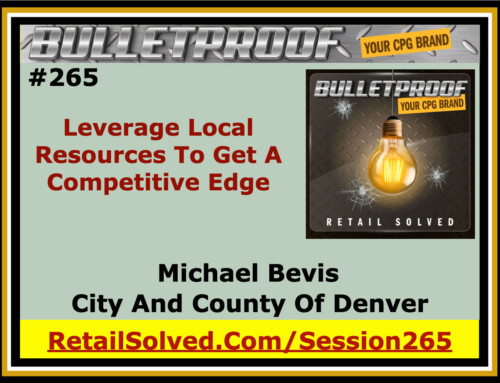Unlock innovative strategies to multiply sales and differentiate your brand from the competition in today's market. Category management enables brands to stand out in a crowded market by providing the advanced strategies that big brands use. Dan highlights the need for innovative strategies that prioritize customer needs and the entire customer journey – what retailers really want!
Your brand strategy needs to be as innovative as your marketing and the ingredients in your products. If you don’t want to be lost in a sea of me-too brands, go beyond the strategies big brands rely on. True Category Management is the great equalizer.
Listen where you get your podcast
Important: Brand Secrets and Strategies has been rebranded to Retail Solved. Please swap all BrandSecretsandStrategies.com URL’s with RetailSolved.com. This is now the Bulletproof Your Brand podcast. Thank you for listening! BRAND SECRETS AND STRATEGIES PODCAST #114 Hello and thank you for joining us today. This is the Brand Secrets and Strategies Podcast #114 Welcome to the Brand Secrets and Strategies podcast where the focus is on empowering brands and raising the bar. I’m your host Dan Lohman. This weekly show is dedicated to getting your brand on the shelf and keeping it there. Get ready to learn actionable insights and strategic solutions to grow your brand and save you valuable time and money. LETS ROLL UP OUR SLEEVES AND GET STARTED! Welcome. Do you want to blend into all of the other brands in your category or do you want to stand out on a crowded shelf? If you don’t want get overlooked in the endless sea of me-too brands — then this podcast episode will change the way you think about your brand strategy. There is a lot of noise from well-meaning experts telling you what to do and how to do it. The problem is that they are sharing what worked yesterday - not what you need to be successful tomorrow and beyond. If you want to know how to become a multi-billion dollar brand and category leader, then you should not get your advice from someone without that level of experience. You need street smarts, not a lot of theory and subjective antidotes. Your business strategy needs to be as innovative as your brand. Anything less and you’ll be constantly swimming against the current. Retailers want and need brands willing and able to help them drive profitable category sales, increase shopper foot traffic, and convert occasional customers into loyal evangelists. Big brands rely on the advanced strategies championed by category management experts. Category Management is the great equalizer between big and small brands. It is also one of the most overused and misunderstood terms in the natural channel. Category Management includes the advanced strategies required to make it easier for customers to find your products where they shop. It includes effective merchandising, increased distribution, maximizing your promotional effectiveness, reducing wasteful trade spending and differentiating your brand at retail. Effective Category Management gives you more runway from your funding, growing sustainable sales in any economy, reducing and even eliminate out-of-stocks, helps you stand out on a crowded shelf and develop a loyal committed community around your brand, and much much more. It can level the playing field, giving you a substantial significant competitive advantage. More importantly, it can help you save valuable time and money. This is why big brands rely so heavily on category management. It’s proven itself repeatedly to be the best sales driver for brands and retailers. This is the most important skill every brand, retailer, and entrepreneur needs in their tool-box. “If you want to play at the level of the big brands, you need to BE at their level” Before I go any further, I want to remind you that there's a free downloadable guide for you at the end of most every podcast episode. I always try to include one easy to download, quick to digest strategy that you can instantly adopt and make your own. One that you can use to grow sustainable sales and compete more effectively. Remember, the goal here is to get your product onto more store shelves and into the hands of more shoppers. As always, I appreciate you for listening. If you liked the podcast, share it with your friends, subscribe and leave a review. Traditional category management relies heavily on what I call a top line canned reports and templates. While these are a great starting place for any analysis, they are not enough to help differentiate you from your competition. Most of these strategies lack creativity and rely heavily on what I call push button category management. I coined the term true category management many years ago to help brands like yours take this to the next level and beyond. I've spent my career pushing big brands around and effectively beating them at their game because I focus on what really matters, the customer. Nothing happens until someone buys something, and the shoppers can't buy your products if they can't find them. True category management focuses on the basics. What retailers really need from you and your brand. It then overlays those strategies to help you help your retail partner compete at the highest levels. It looks at the customer journey from the shopper's perspective. True category management includes everything from, "I have an idea," all the way through to how the customer uses your product after they take it home. Each and every step of the customer journey's important. Brands that overlook any single step along this path are at a competitive disadvantage. Don't be that brand that neglects the importance of having a solid customer-centric strategy for each step of the customer journey. I believe that retailers and brands spend most of their energy trying to get us to buy the stuff on their store shelves as opposed to selling us what we need and want to buy. This is where you come in, like the ripple in the pond, true category management focuses on what shoppers want in both traditional brick and mortar and online retail. I believe that every brand needs to be captain of their own ship. Brands need to commit to the advanced strategies found in true category management, the roadmap to success. It can add rocket fuel to your growth. On my next podcast, you will hear why this matters and why this is critically important to your future. It will determine how long your brand will be around. A week, a month, a year, a decade, or longer? On the next podcast, you will hear from Michael J. O'Donnell, a respected veteran of this industry who has a long and distinguished, proven track record of growing brands of all sizes across all channels. You will not want to miss our conversation. Michael and I candidly discuss, in depth, all the most important things you need to focus on if you want to grow your brand. Our food system is broken. Natural brands are at a significant and substantial competitive advantage. In addition, 80% of natural brands fail within the first year. I'm committed to changing this. Small natural healthy brands are fueling all the sustainable growth across all categories, both in online and in traditional retail while big brands are struggling. In the absence of these small health-focus brands, categories would be flat or declining. Something I've proven in the feature article that I wrote for the 2016 Category Management Handbook. Look for the link below each podcast episode on my website. Healthy natural products include; organic, gluten-free, plant-based, allergy-free, non-GMO, vegan, et cetera. Essentially, the disruptive brands that are changing the way we eat, removing all the nasties as the founder of The Good Crips said, "If you are what you eat then what you eat matters." My mission and the focus of this podcast is to help get healthy products on more store shelves and into the hands of more shoppers. In other words, how small brands can use true category management to compete head-to-head with the most sophisticated brands in their categories, leveling the playing field and even giving you a significant competitive advantage. This podcast is an audio natural products' accelerator. In addition to sharing my 25 plus years of experience more than 80 well-known industry thought leaders, CEOs and founders of successful organizations and brands candidly share their insider secrets and advice with you. Learn actionable insights and strategic solutions to grow your brand and avoid the pitfalls and save valuable time and money. This is the focus of true category management. I'm often asked, "Why do I produce this podcast?" I believe that our food system is broken, especially in mainstream. Retailers spend more time trying to get us to buy their products on their shelves then selling us the products we want to buy. While this sounds subtle, it's dramatic. Wall Street plays too big a role in deciding what products retailers sell. It's mostly about big money. Small, innovative brands are at a substantial disadvantage when it comes to getting retail shelf placement. Consumers can't buy what they can't find. On top of that, the small brands are essentially penalized for being small. Let me explain. Big brands enjoy the benefit of a more efficient distribution system, existing relationships that make it easier for them to gain incremental product placement and distribution and preferential promotional opportunities and the ability to compete on price. Conversely, small brands must rely on distributors to deliver their products through retail stores and brokers to merchandise them. Small brands have a difficult time getting noticed by retailers and getting appointments. Small brands are at the mercy of retailers when it comes to merchandising incremental promotional opportunities and being price-competitive. Furthermore, retailers don't always merchandise natural products to make them easy to shop. For example, placing them in the baking aisle away from other like products. Simply put, it costs more for small brands to compete in any channel. There are more barriers to their success and there are few opportunities for them to be found by shoppers. I believe that small brands deserve an equal seat at the table with retailers and big brands. This can be accomplished by teaching small brands the best practice strategies that big brands rely on. Specifically, the advanced strategies found in true category management. I believe that our food education system is broken. We're told from birth that we are what we eat, but the products available on most store shelves are processed foods that lack the nutrients our bodies need and want. Have you ever eaten something that did not fill you up or leaving you hungry and unsatisfied? Some foods lack the nutritional necessities to satiate you. Innovation for most big brands includes a package change or new flavor. Big brands rely heavily on marketing and promotions to entice shoppers to purchase their products. They spend huge amounts of money to convince us that their product will make us happy and popular. Let's face it, gaining new distribution on a shelf is easy when you already have shelf placement. Conversely, small brands are typically closer to the core shopper. They craft their products, focusing closer in meeting the needs and the wants of their core shopper. True innovation comes to small brands, especially natural organic brands. These custom products are what are fueling the healthy eating movement. Innovation frequently includes disruptive solutions to problems overlooked by big brands like bug protein, grass-fed dairy, and plant-based products, clean label products that are free of allergens and toxins, et cetera. Natural organic health-focused brands are responsible for sustainable growth across every category and across every channel. In their absence, most every category would be flat or declining. These brands should be celebrated for the contribution and their ability to drive sales and profits at retail. They help bring new shoppers into retail. They should not be penalized or overburdened. They're important to every retailer survival and their ability to compete effectively. The strategies in this podcast are focused on helping natural brands help retailers capitalize on the health trends that their shoppers are looking for. I believe that retail is broken. Small brands are unfairly burdened, frequently shouldering the costs that big brands avoid. They're expected to participate in programs that do little to help them attract new customers. On top of that, most retailers focus on the wrong things when measuring their success. Retailers spend a lot of time looking backwards while shoppers look ahead towards solutions that meet their needs. Most retailers are so focused on their internal metrics that they overlook what's important from the category buyers perspective. Retailers used to focus on an item's penny profit. Today, most folks are in sales growth by category. Few retailers focus on what really matters, the shopper. Happy Loyal shoppers spend more per trip. They evangelize their experience with their family and friends and they keep coming back. Retailers need shopper-traffic in their stores. Small local and health-focused brands can help retailers drive shoppers to their stores. It's estimated that the majority of promotions are ineffective at helping brands find and acquire new shoppers, the sole function of every promotion. Small brands find it difficult if not impossible to measure promotions effectiveness. Distributors and retailers don't always guarantee that every store will honor your promotion, sometimes charging a brand extra for a report evaluating the event's performance. Some big brands don't pay slotting and all the fees required of small brands. All these fees add additional cost to a product that then gets passed on to the shopper. Shoppers vote with their dollars, and they have a lot of different retailers competing for the same hard earned money. Small brands need to step up and help retailers convert customers into loyal repeat shoppers. This is at the core of the strategies in true category management. This is where small brands can differentiate themselves and become indispensable to their retail partners. Finally, I believe that our educational programs are broken and natural. The bar's kept low in natural. Small brands don't know what they don't know while big brands invest heavily in educating and nurturing their employees, hiring outside consultants and participating in mastermind style programs. Not available to small brands at the same level. Entrepreneur brands lack the necessary skills to complete effectively with big brands. I have yet to attend any program that fully prepared a small brand to compete at the level of their most sophisticated competitors. Programs lack the proper training to teach small brands how to acquire the actionable insights that's savvy retailers want and need. I've supported brands at all levels and I know this firsthand. Traditional category management is being adopted by retailers. Brands calling on those retailers will be expected to support those retailers at a much higher level than they're used to now. If not, big brands will happily take their seat at the table and this could have a dramatic and lasting impact on a small brands ability to compete and grow. Without naming names, one prominent retailer's already done this at the detriment of small brands. Traditional category management tends to commoditize products in shoppers. It tends to overlook what makes natural natural. This is why natural brands frequently fail after being acquired by big brands. This is where I come in. This is my core strength. This is where small brands and retailers can gain a significant and competitive advantage. Small brands lack the resources to invest in the newest and best technology, the best resources, and in learning the most effective strategies. There are workarounds for all this but it requires an expert to guide them to help them avoid the pitfalls most brands fall into. This is why my mission is to help you get your product onto more retailer shelves and into the hands of more shoppers. Retailers want insights, actionable insights. The most effective way to do this is with sales data, fact-based selling. Most selling is what I would call relationship selling. What I would call the push strategy. This is the strategy that most every brand adopts. This is the strategy that you're probably use to today where your checkbook is the most important resource in your arsenal. This strategy lacks any creativity and it's all based upon how much you can afford to spend in terms of buying a promotion or buying slotting on a shelf, et cetera. What I recommend instead is the pull strategy, the pull strategy's where you develop a relationship with your retail partner and you become a trusted and respected, valued resource. In this role, you actually become advisor for the category and the shopper who buys that category. This is what retailers really need. They need brands to step up and become a category leader. A category leader is any brand willing and able to step up and help guide the retailer to drive sustainable sales in the category. To be successful in this role you need to provide insights, actionable insights to help the retailer grow sales and compete more effectively in their market. Generically speaking, retailers don't make anything. They sell other people's stuff. What they sell is the real estate that your product takes up on their shelf. Retailers only want a couple simple things. They want more shoppers in their store and they want greater profit from the category, and if you as the category leader can help them achieve that, then savvy retailers will bend over backwards to help you achieve your goals, to grow sales and gain incremental distribution. This requires that you be able to tell a compelling selling store with fact-based data, a story that differentiates your brand from your competition. This is exactly why I put together the Free Turnkey Sales Story Strategies course to teach you the basics. They help give you a solid foundation to grow your brand on. This industry has been good to me and this is just my way of giving back. I found throughout my career that too many brands overlooked or skipped the important steps that they need to follow. Let me explain. Have you ever told someone a story and then they tell someone a story and so on? By the time that story comes back around to you, it's unrecognizable. Your story, your brand story needs to be told the same passion, enthusiasm, and excitement as originally told by your founder. Anything less dilutes your brand to the retailers, the shoppers, et cetera. You've got to ensure that your selling story includes everything important to help the retailer help you drive sales with your products. This is the foundation of true category management. You've got to be able to do this successfully. You've got to be able to do it better than any brand on the shelf. This is your unique competitive advantage. Leverage it. In this course, you learn how to gain incremental insights that are usually free by listening to the consumers that buy your products, and there are a lot of different ways to do that. Then when you start adding in the fact-based insights from the data that you acquire from knowing your shopper, et cetera, that's when you really stand out on shelf. That's how you become more than just another brand on a crowded shelf. That's the focus of true category management. And that's exactly why I put together all the mini-courses that I've got on my website. Before I go any further, let me help frame this topic. When I say that I'm a category management expert, what I'm saying is that it's not just a title or statement. I am literally the first person certified at the highest level category management proficiency, a certified professional strategic adviser, CPSA. You typically see people with that skill set, with that designation as a vice president of category management for some of the largest CPG brands in the world. However, I choose to work with small brands to help you get an equal seat at the table with big brands. This is why I put out this podcast, my courses and all the content that I release to help you get your product onto more retail shelves and in the hands of more shoppers. Throughout my career, I've had the opportunity to work with some of the largest, most iconic brands on the planet as well as some of the most innovative disruptive brands in natural. A big part of my career has been focused on getting the most out of the insights from the data and then identifying the best story to help support your brand. When category management was founded it was focused primarily on populating canned templates and creating canned top and reports. In fact, I developed quite a reputation for being able to develop reports for brands. Have you ever seen the distribution report that spins sales? I built that. I developed a report to help them understand the importance of being able to help brands seeing what was going on shelf at other retailers. Nothing like that existed before. The distribution tracker was instrumental to getting them to start selling retail and store-level data. Before then there's no way that a brand had line of sight to what was going on a retailer's shelf. I was also instrumental in developing a lot of reports for retailers and other brands to compete while working for both Kimberly Clark and Unilever in addition to all my clients. Like I say repeatedly, top can line reports are a great place to start, but they are not the ending place. This is where you start developing your insights. What you need to do is be able to understand how to tell a story with that data. For example, my greatest win in this industry was gaining exclusive distribution for a multi-billion brand across many channels. In addition to that, I developed some really advanced reporting tools that help identify the contribution back to the brand after promotion. This is really advanced stuff. This is something I'm going to say for an advanced signature course down the road but simply put, being able to identify the true ROI from a promotion down to the penny across multiple packages and across multiple retailers for a single event. I have to be honest, I have yet to see any tool anywhere provided by any solution provider that was anywhere near as robust as a tool that I created many years ago. This is something like I said I'll be talking about later, so stay tuned. So like I said, when I started this conversation, knowing your numbers, understanding how to tell your selling story, a compelling selling story with true category management that is a game changer that's going to differentiate your brand. That's going to help you stand out on a crowded shelf and give you a significant and substantial competitive advantage. As a certified professional strategic adviser, a true category management expert, I am committed to helping you get your product onto more retailer shelves and in the hands of more shoppers. In addition to the podcast, all my content and everything that I make available, I just launched my true category management, the Roadmap To Sales Success Mini-Course. This is the great equalizer between small and large brands. Lean what retailers really want, how to grow sustainable sales and profits. In this mini-course, you're going to learn how to implement the strategies that big brand use. Discern what category management is and what it is not and what it includes. Identify the difference between category management and true category management. Includes shopper, consumer insights, and why they matter. Gain a substantial competitive advantage using category management. Determine what data you need and why it's important, and how to tell a compelling selling story with fact-based actionable insights. You can go to this mini-course by going to brandsecretsandstrategies.com/thegreatequalizer or by getting it on the podcast show notes, or on the courses tab on my website. Thank you for listening. I appreciate you. Remember, this podcast is about you and it's for you. This week's free downloadable guide is essential new item checklist. This is critical. The things that you critically need to know to be able to get your product under a retailer's shelf. Think about it. The lifeblood of every brand is your innovation, getting your product onto more retailer shelves, but there are a lot of things that brands overlook. This guide, this worksheet will help you identify those key and very important things that could derail or even bankrupt you if you don't get these things right. You can get this by going to brandsecretsandstrategies.com/session114 or on the podcast webpage. Don't forget to listen to next week's podcast. It's going to help you connect all the dots as to why this matters. I look forward to seeing you in the next episode. Thanks again for joining us today. Make sure to stop over at brandsecretsandstrategies.com for the show notes along with more great brand building articles and resources. Check out my free course Turnkey Sales Story Strategies, your roadmap to success. You can find that on my website or at TurnkeySalesStoryStrategies.com/growsales. Please subscribe to the podcast, leave a review, and recommend it to your friends and colleagues. Sign up today on my website so you don’t miss out on actionable insights and strategic solutions to grow your brand and save you valuable time and money. I appreciate all the positive feedback. Keep your suggestions coming. Until next time, this is Dan Lohman with Brand Secrets and Strategies where the focus is on empowering brands and raising the bar.
Enter your name and email address below and I'll send you periodic brand building advice, tips and strategies.
Sign up to receive email updates
FREE Trade Promotion ROI Calculator:
Click Here To Maximize Sales And Profits
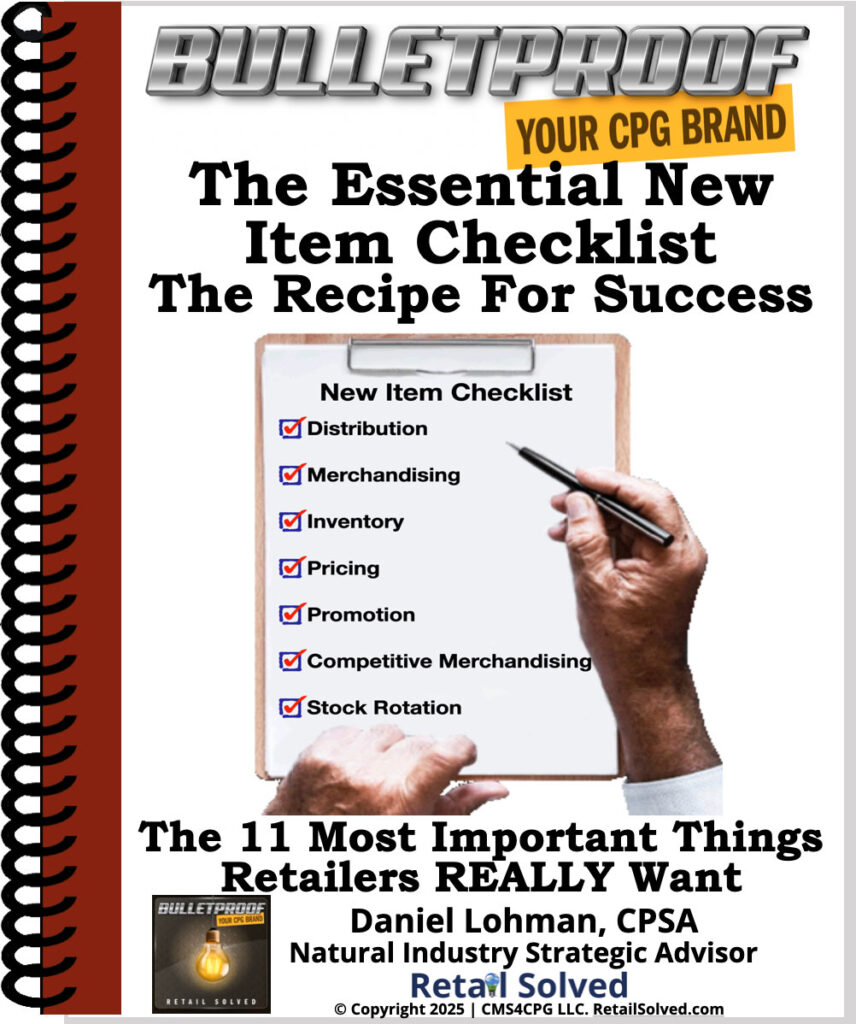
The Essential New Item Checklist – The Recipe For Success
Want A Competitive Edge? The Recipe For Success
New product innovation is the lifeblood of every brand. New products fuel sustainable growth, attract new shoppers and increase brand awareness. Learn the critical steps to get your product on more retailer’s shelves and into the hands of more shoppers. Maximizing your trade marketing can pour rocket fuel on your launch.
Image is the property of CMS4CPG LLC, distribution or reproduction is expressively prohibited.
